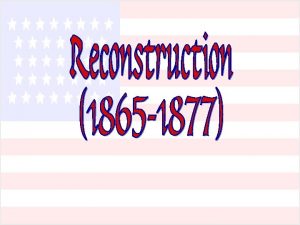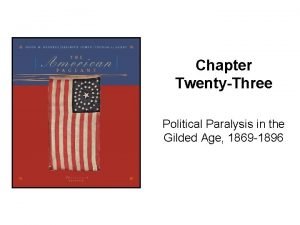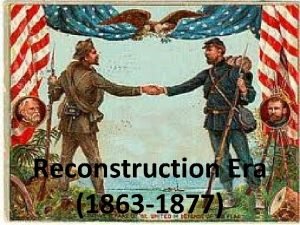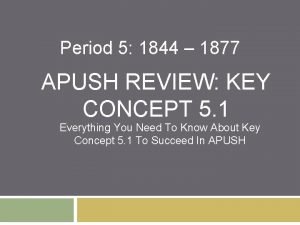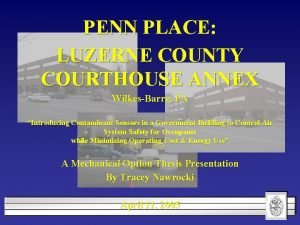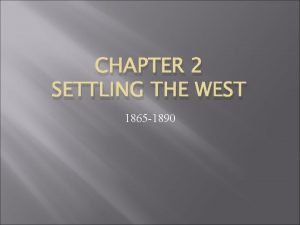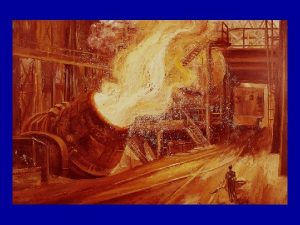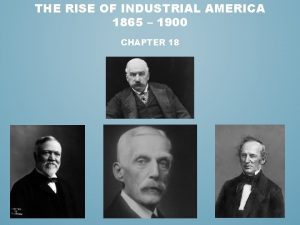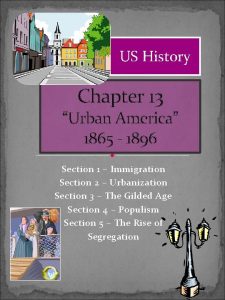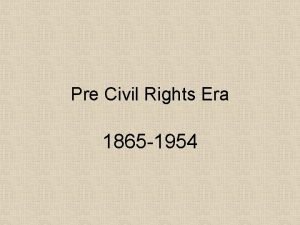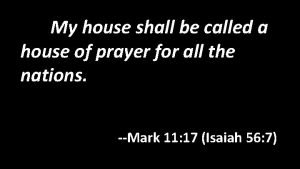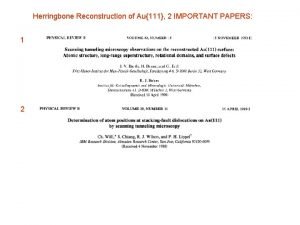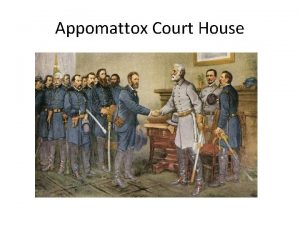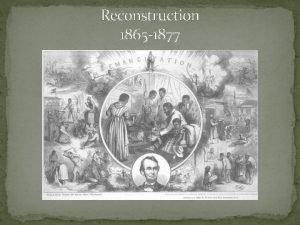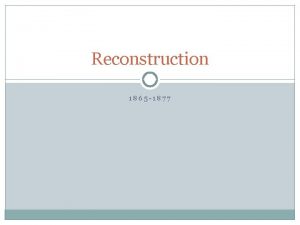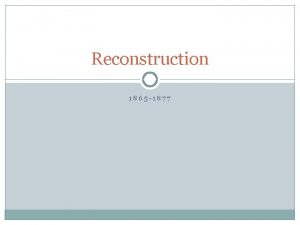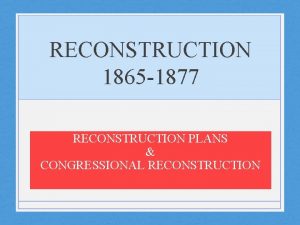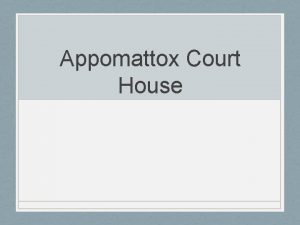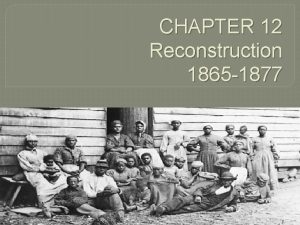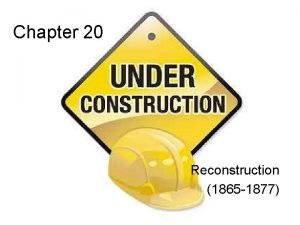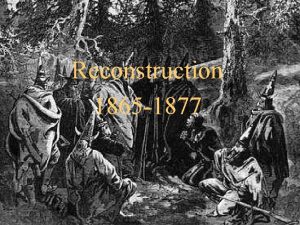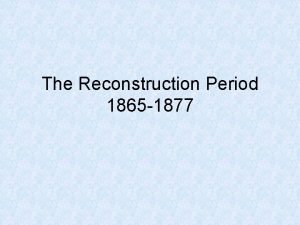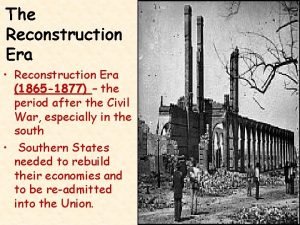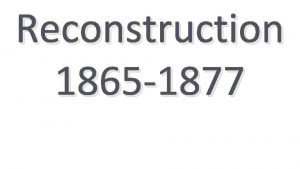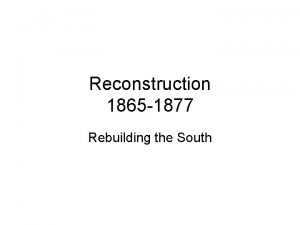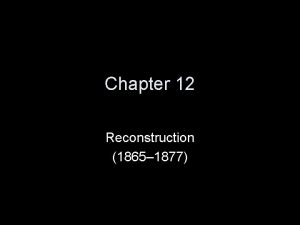Reconstruction 1865 1877 Appomattox Court House Lee Surrenders










![• “With malice [hatred] toward none, with charity for all, with firmness in • “With malice [hatred] toward none, with charity for all, with firmness in](https://slidetodoc.com/presentation_image/d3015fbb659c795aa4d3d6b4e47516a6/image-11.jpg)
































- Slides: 43

Reconstruction 1865 -1877

Appomattox Court House

Lee Surrenders

“Abandon your animosities, and make your sons Americans. ” -Robert E. Lee Think, pair, share-What does this mean?

Richmond, VA XIII. RECONSTRUCTION

Charleston, SC

Columbia, SC

After The War • Northern victory in the Civil War decided the fate of the Union, but posed numerous questions leading to disagreements among the nation’s people. • How should the Southern states be reintegrated into the Union? • What system of labor should replace slavery? • What would be the status of the former slaves? • What degree of federal control should be imposed on the South?

What is Reconstruction? The period after the American Civil War when the southern states were reorganized and reintegrated into the Union; 1865 -1877 Involved a complex and rapidly changing series of federal and state policies.

Lincoln’s Second Inaugural Address • On March 4, 1865, President Lincoln laid out his approach to Reconstruction in his second inaugural address. • He hoped to reunite the nation and it’s people.
![With malice hatred toward none with charity for all with firmness in • “With malice [hatred] toward none, with charity for all, with firmness in](https://slidetodoc.com/presentation_image/d3015fbb659c795aa4d3d6b4e47516a6/image-11.jpg)
• “With malice [hatred] toward none, with charity for all, with firmness in the right as God gives us to see the right, let us finish the work we are in, to bind up the nation's wounds, to care for him who shall have borne the battle, and for his widow and for his orphans, to do all which may achieve and cherish a just and a lasting peace among ourselves and with all nations. ” --Abraham Lincoln March 4, 1865 What is President Lincoln’s main goal post Civil War?

By far the most lenient of plans for Reconstruction, Abraham Lincoln’s Ten Percent Plan would never be articulated in full – for he was assassinated. The principle points of the plan, however, were clear: q 10% of a state must declare loyalty q. Every state must ban slavery. q. Confederate government leaders or top military officials could NOT represent the state in government positions. Lincoln’s Ten Percent Plan

Lincoln’s Assassination • Lincoln was assassinated before his plan could be put into place. • John Wilkes Booth. Ford Theater-April 14, 1865 • Vice President Andrew Johnson became president.

http: //www. youtube. com/watch? v=6 q. Ae. Fj. Cs c. RY –Lincoln assassinated

Johnson’s Reconstruction Plan • Pardons would be granted to Southerners taking a loyalty oath • A state needed to abolish slavery before being readmitted (13 th amendment) • A state was required to repeal its secession ordinance before being readmitted.

Radical Republican plan • Creation of a Freedmen's Bureau-help newly freed slaves. • Passage of the Civil Rights Act of 1866 -help protect freedmen from laws discriminating against feed slaves that were being passed in many Southern states. • Passage of the 14 th Amendment-equal citizenship • Passage of Reconstruction Acts that made restoration to the Union more difficult. http: //www. youtube. com/watch? v=pt. XRFHulc ZQ -plans

Reconstruction Act of 1867 • Put the South under military rule, dividing it into five districts, each governed by a northern general. • It ordered southern states to create new state constitutions. • Required states to allow all qualified male voters, including African Americans, to vote in the election. • Temporarily barred southerners who had supported the Confederacy from voting. • Required southern states to guarantee equal rights to all citizens. • Required the states to ratify the 14 th amendment *14 th amendment- state shall not deprive any person of life, liberty, and property, without due process of law, nor deny any person equal protection of the laws.


Impeaching President Johnson • Congress passed the Tenure of Office Act which stripped the President of the power to remove federal officials without the Senate's approval. • In direct opposition to the act, he fired Secretary of War Stanton. • Congress then voted to impeach(remove from office) Johnson by a vote of 126 to 47 in February 1868.

Impeach – put a government official on trial • Only 2 presidents have been impeached. . . • Andrew Johnson • Bill Clinton Charges brought in the House, trial held in the Senate • Both were found NOT GUILTY and allowed to finish their terms.

Effects of Reconstruction

13 th Amendment-1865 • Abolished slavery • All slaves were now FREE

14 th Amendment-1868 Guaranteed equal protection and due process for all CITIZENS Repealed the 3/5 Compromise This amendment was used frequently during the Civil Rights Movement.

15 th Amendment-1870 • Guaranteed that voting rights are not denied to people because of their race • Black males can now VOTE http: //www. youtube. com/watch? v=Cpi. H 2 b 92 3 pc&list=PLs 4 g 4 k. Eq. Ct. Rr 36 S 040 d. Z_IWHERyvn 2 a. L (amendments)

“FREE CITIZENS VOTE” • A phrase to help you remember these 3 important Constitutional Amendments

Freedmen’s Bureau

Freedmen’s Bureau • Gov’t agency set up to provide food, shelter, clothing, education, and jobs for newly freed slaves • Many settled on plantation lands

Freedmen’s Bureau • Task of feeding and clothing former slaves • Find work for them • Negotiate labor contracts • Education was a large focus!

Freedmen’s Bureau

Which way will the scale tip? Social equality vs. legal equality

The Cycle of poverty • Freedman had no money to buy land of their own • Many freed slaves resorted to Sharecropping • Sharecropping- freed blacks would rent small plots of land farm it. In return, they would give a portion of their crop to the landowner at the end of the year. • continues the cycle of poverty

Black Codes • White Southerners sought ways to control newly freed African Americans • They wrote Black Codes- laws to regulate civil and legal rights, from marriage to the right to hold and sell property African American men who were arrested for vagrancy due to unemployment http: //history. sandiego. edu/gen/civilwar/16/reconstructio n 1. html • In many ways, the Black Codes guaranteed African Americans would continue working as farm laborers

Segregation • After Reconstruction, there were several ways that Southern states kept Blacks from voting and segregated, or separating people by the color of their skin in public facilities. • Jim Crow laws, laws at the local and state level which segregated whites from blacks and kept African Americans as 2 nd class citizens and from voting.

Voting Restrictions vpoll taxes-require voters to pay a fee each time they vote. -Freed slaves rarely had the money to pay vliteracy tests-voters must read and explain a difficult part of the Constitution -Many were illiterate (could not read) vgrandfather clause-were exempt from the literacy test if your father or grandfather had voted -None of the fathers or grandfathers of freed slaves would have voted


social reality Plessy vs. Ferguson, 1896 Supreme Court case that legalized segregation throughout the nation. • “Separate but Equal”-public facilities could be separate as long as they were equal • Problem: Black facilities never equal to White facilities http: //www. youtube. com/watch? v=ua. SOHKBt ua. U

Plessy vs. Ferguson, 1896 -public facilities remain segregated until 1954 with the: Brown V. Board of Education decision -”Separate is inherently unequal”

Ku Klux Klan • Started in 1866 by Nathaniel Bedford Forrest • Secret society • Mostly former Confederate soldiers • Used terror as tactic

Which way will the scale tip? Social equality vs. legal equality

The End of Radical Reconstruction • Federal Reconstruction ended in 1876 with the election of Rutherford B. Hayes to the presidency • A few weeks after taking office Hayes issued an order for the removal of all federal soldiers stationed in the South • The end of Reconstruction led to a drastic reduction of rights for African Americans President Rutherford Hayes http: //www. loc. gov/rr/print/list/057_pra 3. htm l

Compromise of 1877 • Gov’t removal of federal troops to the south • Federal funds to rebuild South • Democrats promised to respect African Americans’ rights

RECONSTRUCTION 1865 -1877 SUCCESSES AND FAILURES

RECONSTRUCTION SUCCESSES FAILURES • Rebuilt the Union • A lot of blacks were still poor • 13 th, 14 th and 15 th Amendments • Ku Klux Klan • Blacks could testify in court • Limits on voting for blacks • Educated, housed, and gave jobs to blacks • Racist/prejudice views were still held by many whites • Increased access to education for all Southerners • Some Southerners were bitter towards the Federal Government • Reduction of rights for freed slaves
 Surrender at appomattox court house significance
Surrender at appomattox court house significance Antietam and emancipation
Antietam and emancipation 1877-1865
1877-1865 Is there a basketball court above the supreme court
Is there a basketball court above the supreme court House of the faun reconstruction
House of the faun reconstruction 1877 golden 1
1877 golden 1 The key tradeoff featured in the compromise of 1877
The key tradeoff featured in the compromise of 1877 Compromise of 1877
Compromise of 1877 Tanssija 1877-1927
Tanssija 1877-1927 Georgia history timeline 1877-1919
Georgia history timeline 1877-1919 Gilded age union strikes
Gilded age union strikes Define reconstruction era
Define reconstruction era Compromise of 1877 apush
Compromise of 1877 apush Whats the compromise of 1877
Whats the compromise of 1877 Great railroad strike of 1877 significance
Great railroad strike of 1877 significance The gilded age 1877 to 1898 worksheet answers
The gilded age 1877 to 1898 worksheet answers Apush period 5 key concepts
Apush period 5 key concepts Penn place building
Penn place building Hollywood silver fox farm v emmett
Hollywood silver fox farm v emmett Industrialization 1865 to 1901
Industrialization 1865 to 1901 Chapter 2 settling the west
Chapter 2 settling the west Realism v naturalism
Realism v naturalism The rise of industrial america 1865-1900
The rise of industrial america 1865-1900 Becoming a world power 1865-1917
Becoming a world power 1865-1917 Industrialization (1865 to 1901 worksheet answers key)
Industrialization (1865 to 1901 worksheet answers key) Gregor mendel 1865
Gregor mendel 1865 Four features of industrial manufacturing (1865-1900)
Four features of industrial manufacturing (1865-1900) What are characteristics of impressionism
What are characteristics of impressionism Urban america 1865 to 1896
Urban america 1865 to 1896 1865 to 1900 inventions
1865 to 1900 inventions Where did the term “impressionism” come from?
Where did the term “impressionism” come from? 15 th ammendment
15 th ammendment Becoming a world power 1865-1917
Becoming a world power 1865-1917 Role of acceptance and discount house
Role of acceptance and discount house They went house to house
They went house to house Snugbug homes
Snugbug homes Helel keller
Helel keller Banished boarding house vs house
Banished boarding house vs house My house shall be called a house of prayer
My house shall be called a house of prayer Presidential and congressional reconstruction venn diagram
Presidential and congressional reconstruction venn diagram What ended reconstruction
What ended reconstruction Au(111) herringbone
Au(111) herringbone The competing visions of reconstruction
The competing visions of reconstruction Presidential and congressional reconstruction venn diagram
Presidential and congressional reconstruction venn diagram


